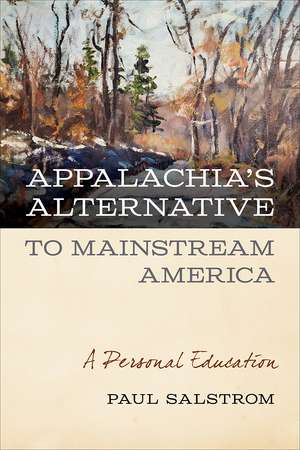Appalachia's Alternative to Mainstream America: A Personal Education
Autor Paul Salstromen Limba Engleză Paperback – 2 noi 2021
In Appalachia’s Alternative to Mainstream America, Salstrom outlines his Appalachian experiences in a memoir, revisiting this back-to-the-land tradition that guided his cultural experience during this time. While he pursued a number of experimental alternatives to a mainstream way of life during the late 1960s, it was not until he landed in Lincoln County a few years later that he found himself engaging in an alternative way of living that didn’t feel “experimental” at all. This distinctive way of life was largely characterized by a closer connection to the earth—local sufficiency informed by homesteading, subsistence farming, and gardening—and the community-wide trading of favors in a spirit of mutual aid.
Over time, Salstrom’s engagement in this “neighborly” occupation has nurtured an informed belief that Americans will be drawn back to landed customs, taking care of the earth and of one another to thrive as individuals and communities. Facing today’s pandemics, climate change, and deepening political divisions, says Salstrom, Americans urgently need to create a groundswell of localized food security and energy production.
Preț: 115.27 lei
Nou
Puncte Express: 173
Preț estimativ în valută:
22.06€ • 23.15$ • 18.31£
22.06€ • 23.15$ • 18.31£
Carte disponibilă
Livrare economică 20 martie-03 aprilie
Preluare comenzi: 021 569.72.76
Specificații
ISBN-13: 9781621907152
ISBN-10: 1621907155
Pagini: 252
Dimensiuni: 152 x 229 x 18 mm
Greutate: 0.45 kg
Ediția:1st Edition
Editura: University of Tennessee Press
Colecția Univ Tennessee Press
ISBN-10: 1621907155
Pagini: 252
Dimensiuni: 152 x 229 x 18 mm
Greutate: 0.45 kg
Ediția:1st Edition
Editura: University of Tennessee Press
Colecția Univ Tennessee Press
Notă biografică
PAUL SALSTROM, now retired, is professor emeritus of history at Saint Mary-of-the-Woods College in Indiana. He is the author of Appalachia’s Path to Dependency: Rethinking a Region’s Economic History, 1730–1940 and From Pioneering to Persevering: Family Farming in Indiana to 1880.
Descriere
In many communities across North America in the 1960s and 1970s, the rural-relocation movement became both a way of life and a path forward for many people inclined to buck the mainstream—and Paul Salstrom embraced it. His experiences in rural Lincoln County, West Virginia, led him to the self-sufficient, “neighborly networking” lifestyle well known in many Appalachian communities since the early nineteenth century.
In Appalachia’s Alternative to Mainstream America, Salstrom outlines his Appalachian experiences in a memoir, revisiting this back-to-the-land tradition that guided his cultural experience during this time. While he pursued a number of experimental alternatives to a mainstream way of life during the late 1960s, it was not until he landed in Lincoln County a few years later that he found himself engaging in an alternative way of living that didn’t feel “experimental” at all. This distinctive way of life was largely characterized by a closer connection to the earth—local sufficiency informed by homesteading, subsistence farming, and gardening—and the community-wide trading of favors in a spirit of mutual aid.
Over time, Salstrom’s engagement in this “neighborly” occupation has nurtured an informed belief that Americans will be drawn back to landed customs, taking care of the earth and of one another to thrive as individuals and communities. Facing today’s pandemics, climate change, and deepening political divisions, says Salstrom, Americans urgently need to create a groundswell of localized food security and energy production.
In Appalachia’s Alternative to Mainstream America, Salstrom outlines his Appalachian experiences in a memoir, revisiting this back-to-the-land tradition that guided his cultural experience during this time. While he pursued a number of experimental alternatives to a mainstream way of life during the late 1960s, it was not until he landed in Lincoln County a few years later that he found himself engaging in an alternative way of living that didn’t feel “experimental” at all. This distinctive way of life was largely characterized by a closer connection to the earth—local sufficiency informed by homesteading, subsistence farming, and gardening—and the community-wide trading of favors in a spirit of mutual aid.
Over time, Salstrom’s engagement in this “neighborly” occupation has nurtured an informed belief that Americans will be drawn back to landed customs, taking care of the earth and of one another to thrive as individuals and communities. Facing today’s pandemics, climate change, and deepening political divisions, says Salstrom, Americans urgently need to create a groundswell of localized food security and energy production.
